river guide
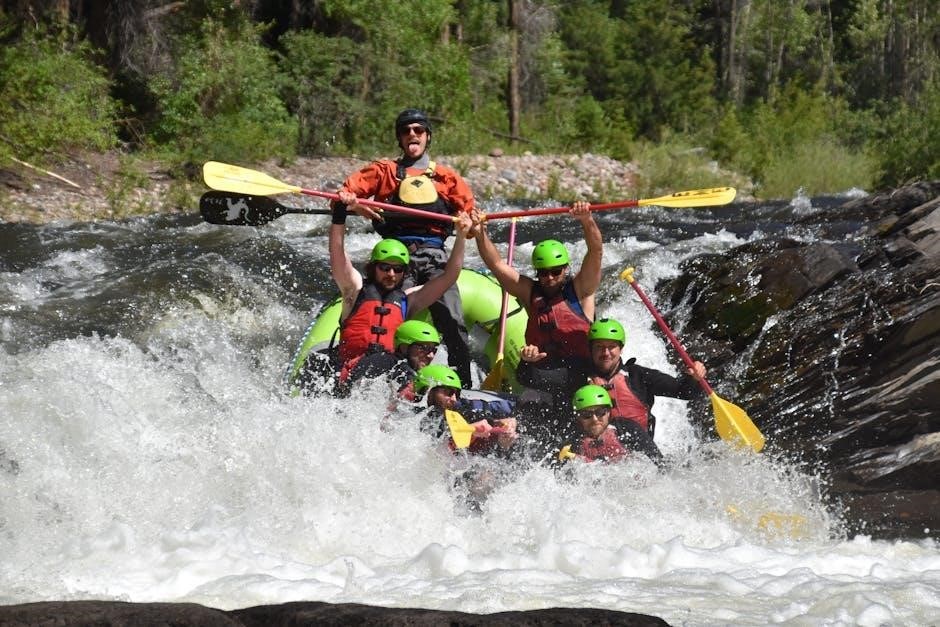
A river guide is an expert who leads and navigates groups on water adventures‚ ensuring safety and enhancing experiences․ They use tools like the Georgia River Guide app for real-time data‚ while also sharing stories and preparing meals․ Beyond navigation‚ guides act as educators‚ conservationists‚ and storytellers‚ fostering a deeper connection with nature and culture․
Overview of River Guides and Their Importance
River guides are experts who ensure safe and enjoyable water adventures‚ offering invaluable knowledge of rivers‚ ecosystems‚ and navigation․ They act as educators‚ conservationists‚ and storytellers‚ enhancing the overall experience․ By using tools like the Georgia River Guide app‚ they provide real-time data‚ ensuring informed decision-making․ Their role extends beyond navigation‚ fostering connections between people and nature while promoting sustainable exploration of waterways․
History and Evolution of River Guiding
River guiding has evolved from traditional navigation by indigenous communities to modern‚ organized tours․ Early guides relied on local knowledge and handmade crafts‚ while today’s guides use advanced technology like the Georgia River Guide app․ The profession has grown into a global industry‚ blending cultural heritage with safety standards and environmental awareness‚ making river adventures accessible to diverse audiences while preserving river ecosystems․
Role and Responsibilities of a River Guide
A river guide ensures safe navigation‚ manages risks‚ and enhances the experience for participants․ They handle logistics‚ provide education‚ and foster connections with nature and culture․
Key Duties and Skills Required
River guides must possess strong navigation and leadership skills‚ ensuring safe passage through various water conditions․ They need excellent communication abilities to interact with diverse groups and provide clear instructions․ Physical stamina‚ problem-solving‚ and adaptability are crucial․ Guides also manage gear‚ prepare meals‚ and handle emergencies‚ making them versatile professionals who balance safety with memorable experiences for participants․
Ensuring Safety and Managing Risks
River guides prioritize safety by assessing water conditions‚ monitoring weather‚ and using safety gear․ They conduct risk assessments and brief participants on hazards․ Guides are trained in emergency response‚ including first aid and swiftwater rescue․ Maintaining equipment and staying vigilant ensures preparedness for unexpected situations‚ while self-care helps guides remain alert and effective during multi-day trips․
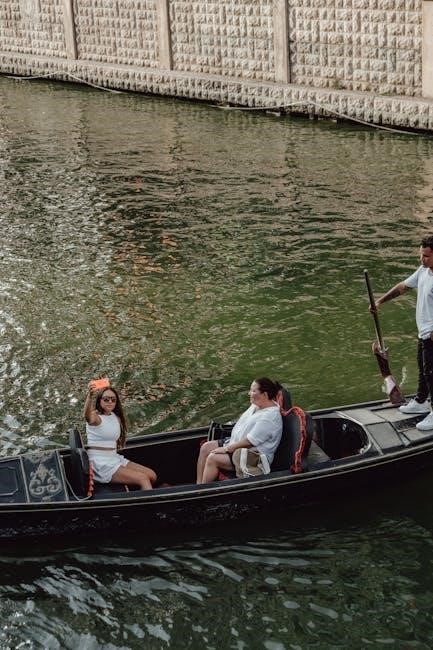
Essential Skills for River Guides
Navigation‚ leadership‚ and first aid are critical․ Guides must manage gear‚ read water conditions‚ and communicate effectively․ Self-care and storytelling enhance the guiding experience‚ ensuring safety and engagement․
Navigation and Leadership Techniques
Effective river guides master navigation using digital maps and apps like the Georgia River Guide‚ ensuring accurate route planning․ Leadership involves motivating participants‚ making swift decisions‚ and maintaining group safety․ They expertly read water currents‚ anticipate hazards‚ and adapt strategies․ Clear communication and problem-solving skills are crucial‚ while storytelling enriches the experience‚ fostering trust and engagement among adventurers․
Emergency Response and First Aid
River guides are trained to handle emergencies swiftly‚ utilizing tools like the Georgia River Guide app for real-time data․ They administer first aid‚ manage risks‚ and communicate clearly․ Quick decision-making and calmness under pressure are crucial․ Guides ensure proper gear maintenance‚ like waterproof boots‚ to prevent incidents․ Their crisis management expertise ensures safety and builds trust among participants․
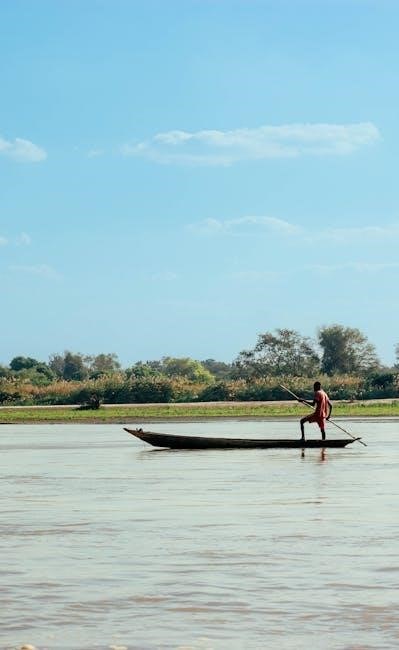
Best Rivers for Guided Tours
From the scenic Colorado River to the majestic Amazon‚ guided tours offer unforgettable experiences․ Each river boasts unique features‚ such as stunning landscapes‚ diverse wildlife‚ and historical significance․
Popular Destinations Around the World
Popular river destinations include the Colorado River for rafting‚ the Amazon for wildlife‚ and the Ganges for cultural experiences․ The Nile offers historical explorations‚ while the Danube provides scenic European vistas․ Rivers like the Salmon in Idaho and the Futaleufú in Chile are renowned for thrilling rapids․ Each destination attracts adventurers seeking unique experiences‚ from serene floats to adrenaline-pumping descents‚ guided by experts who ensure safety and memorable journeys․
Unique Features of Each River
Each river boasts distinct features‚ such as the Colorado River’s dramatic canyons‚ the Amazon’s lush biodiversity‚ and the Ganges’ sacred cultural significance; The Danube offers historic European landscapes‚ while the Salmon River in Idaho is prized for its crystal-clear waters and thrilling rapids․ These unique characteristics‚ from geology to wildlife‚ make each river a captivating destination for explorers and adventurers seeking diverse experiences․
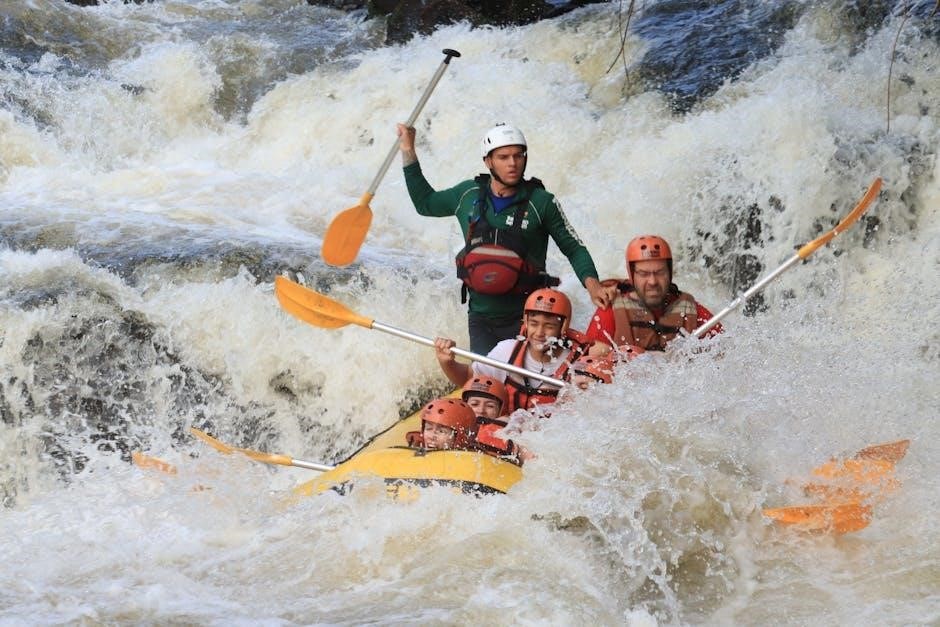
Safety Tips for River Adventures
Always check river conditions‚ wear protective gear‚ and stay alert․ Use apps like the Georgia River Guide for real-time data‚ and ensure proper equipment maintenance for safe journeys․
Preparation and Awareness
Understanding river conditions and using apps like the Georgia River Guide ensures real-time data for safe navigation․ Always check water levels‚ weather forecasts‚ and potential hazards․ Familiarize yourself with the river’s flow‚ currents‚ and obstacles․ Pack essential gear‚ including safety equipment and a first-aid kit․ Stay informed about local regulations and environmental factors to minimize risks and enhance your adventure experience on the water․
Handling Common Hazards
River guides must be adept at identifying and managing risks like strong currents‚ rapids‚ and unexpected obstacles․ Use safety lines and throw bags for emergencies․ Stay vigilant for changing water levels and weather conditions․ Knowing first aid and having a plan for medical emergencies is crucial․ Always scout challenging sections beforehand to ensure safe navigation and minimize potential dangers during the trip․
Gear and Equipment for River Guides
Gear and Equipment for River Guides
River guides rely on durable‚ water-resistant gear like inflatable rafts‚ paddles‚ and personal flotation devices․ Waterproof bags protect essentials‚ while multi-layered clothing offers comfort in varying conditions․ Proper footwear ensures stability on wet surfaces‚ and safety lines or throw bags are crucial for emergencies․ Regular inspections and maintenance of equipment are essential for reliability and performance during trips․
Essential Gear for Different River Types
Whitewater rivers demand sturdy inflatable rafts‚ helmets‚ and high-flotation PFDs for safety․ Calm rivers may use lightweight kayaks or canoes with aluminum paddles․ Multi-day trips require waterproof bags‚ camping gear‚ and water purification systems․ Durable‚ multi-layered clothing and quick-drying footwear are versatile for varying conditions․ Safety lines and throw bags are crucial for swift-water rescues․ Proper gear selection ensures both safety and efficiency on any river adventure․
Maintenance and Care of Equipment
Regular cleaning and drying of gear prevent mold and damage․ Store inflatable boats in shaded‚ cool areas to avoid UV degradation․ Inspect equipment for wear and tear‚ repairing tears or leaks promptly․ Use mild detergents for washing and avoid abrasive materials․ Lubricate zippers and hinges to ensure smooth operation․ Proper storage and maintenance extend the lifespan of gear‚ ensuring safety and reliability on river adventures․
Environmental Considerations
River guides emphasize minimizing ecological impact by reducing waste and promoting sustainable practices․ They educate participants on preserving waterways and wildlife‚ fostering a culture of environmental stewardship and responsibility‚ and ensuring rivers remain pristine for future generations to enjoy and explore safely․
Minimizing Impact on River Ecosystems
River guides prioritize sustainable practices to protect aquatic environments․ They promote leaving no trace‚ using biodegradable products‚ and avoiding sensitive habitats․ By educating participants on eco-friendly behaviors‚ guides help preserve water quality‚ wildlife‚ and natural landscapes‚ ensuring rivers remain healthy and pristine for future generations to enjoy and explore responsibly․
Best Practices for Sustainable Guiding
River guides adopt eco-conscious practices‚ such as using biodegradable supplies and minimizing waste․ They utilize apps like the Georgia River Guide for real-time environmental monitoring․ Educating clients on low-impact behaviors and promoting responsible gear use are key․ Guides also collaborate with conservation efforts‚ ensuring sustainable tourism that preserves river ecosystems and supports local communities while maintaining the natural beauty of waterways for future generations․
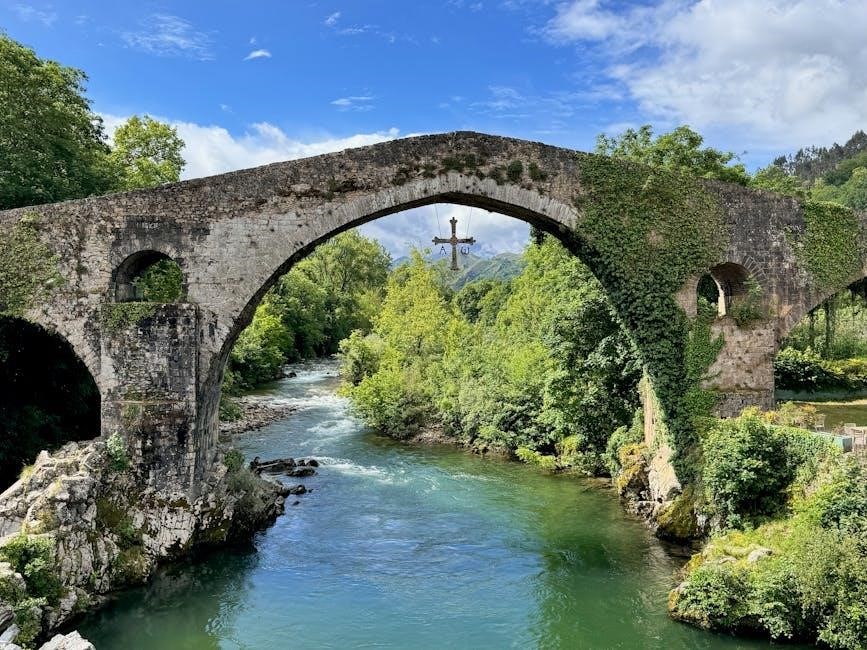
Technology and Tools for River Guides
River guides utilize apps like the Georgia River Guide and New Zealand RiverGuide for navigation‚ environmental monitoring‚ and real-time data․ These tools enhance safety and efficiency‚ providing critical information on river conditions‚ flow rates‚ and potential hazards‚ ensuring informed decision-making during expeditions․
Using Apps and Digital Maps
Modern river guides rely on apps like the Georgia River Guide and New Zealand RiverGuide for real-time data on river conditions‚ flow rates‚ and rainfall․ These tools provide detailed maps‚ navigation assistance‚ and environmental insights‚ enhancing safety and efficiency․ Apps also offer live location tracking‚ rapids information‚ and campsite details‚ making them indispensable for planning and executing successful river expeditions with precision and confidence․
Advancements in River Navigation Technology
Recent advancements include GPS tracking devices‚ wearable technology‚ and real-time environmental monitoring systems․ These tools help guides predict river conditions‚ track gear‚ and ensure safety․ Apps and digital maps provide detailed insights‚ while sensor-equipped boats monitor water quality and flow rates․ Such innovations enhance navigation accuracy‚ reduce risks‚ and promote sustainable guiding practices‚ making river adventures safer and more efficient for both guides and participants․
Community and Networking
River guides connect through forums‚ collaborative projects‚ and shared resources‚ fostering a supportive network that enhances skills‚ shares knowledge‚ and promotes sustainable guiding practices globally․
Building Relationships with Other Guides
River guides build strong relationships through shared experiences‚ collaborative projects‚ and mutual respect․ They connect via forums‚ events‚ and shared resources‚ fostering camaraderie and knowledge exchange․ These networks help guides stay updated on best practices‚ safety protocols‚ and environmental stewardship‚ reinforcing a sense of community and shared purpose in their work․
Resources and Forums for River Guides
Online forums and communities like the New Zealand RiverGuide and UK Canoeing platforms provide essential resources for river guides․ These platforms offer flow data‚ environmental insights‚ and networking opportunities․ Guides also benefit from training programs and apps like the Georgia River Guide‚ which enhance safety and navigation skills‚ while fostering collaboration and knowledge sharing within the river guiding community․
Career Path and Opportunities
A career as a river guide begins with gaining experience‚ often starting as an assistant․ Guides progress to lead roles‚ specializing in rafting‚ kayaking‚ or fishing․ Many transition to full-time positions or advanced certifications‚ while others explore entrepreneurial ventures‚ creating guide services or leading expeditions globally․
Getting Started as a River Guide
Starting as a river guide involves gaining hands-on experience‚ often through apprenticeships or volunteer work․ Many begin by assisting seasoned guides‚ learning navigation‚ safety protocols‚ and group management․ Formal training programs‚ such as those offered by the Whitewater Rafting Federation‚ provide essential certifications․ Building a strong foundation in first aid‚ emergency response‚ and environmental knowledge is crucial for success in this rewarding field․
Advanced Opportunities and Specializations
Experienced river guides can specialize in niche areas like ecological tours‚ cultural expeditions‚ or extreme whitewater adventures․ Advanced guides often lead multi-day trips‚ mentor newcomers‚ or develop custom itineraries․ Some transition into roles like trip coordinators or outdoor educators‚ while others explore technology‚ such as app development for river navigation․ Specialized knowledge in river ecosystems or historical sites further enhances their expertise and career prospects․
Cultural and Historical Significance
Rivers hold deep cultural and historical value‚ with guides sharing stories and legends tied to their waters․ This connection enriches experiences‚ preserving heritage and fostering appreciation for nature’s history․
Learning About the River’s Heritage
Guides often share stories and legends tied to the river‚ enriching the experience․ Tools like the Georgia River Guide app and New Zealand RiverGuide provide historical insights‚ while seasoned guides offer firsthand accounts of cultural significance․ This storytelling fosters a deeper appreciation for the river’s history and its role in shaping local communities and ecosystems‚ promoting preservation of its heritage for future generations․
Sharing Stories and Legends
River guides often captivate travelers with tales of the river’s history‚ myths‚ and cultural significance․ From stories of ancient civilizations to legends of hidden treasures‚ these narratives enrich the journey․ Guides like Butch Hancock and Bridget Crocker share personal anecdotes and folklore‚ making the experience more engaging․ Such storytelling not only entertains but also fosters a deeper emotional connection to the river and its surroundings․
Being a river guide is a rewarding blend of adventure‚ storytelling‚ and environmental stewardship․ It’s a role that fosters connection‚ educates‚ and inspires a love for nature․
Final Thoughts on Being a River Guide
Being a river guide is a deeply rewarding profession‚ blending adventure‚ education‚ and environmental stewardship․ It requires adaptability‚ compassion‚ and a passion for nature․ Guides inspire others to appreciate rivers‚ fostering a connection between people and the natural world․ From using apps like the Georgia River Guide to sharing stories‚ this role is both challenging and fulfilling‚ leaving a lasting impact on all who embark on the journey․
Encouragement for Aspiring Guides
Becoming a river guide offers a unique opportunity to combine adventure‚ education‚ and conservation․ Aspiring guides can inspire others by sharing stories‚ teaching safety‚ and fostering a love for nature․ Embrace the challenge‚ build strong connections‚ and make a difference․ With passion and dedication‚ you can create unforgettable experiences and leave a lasting impact on those you guide․